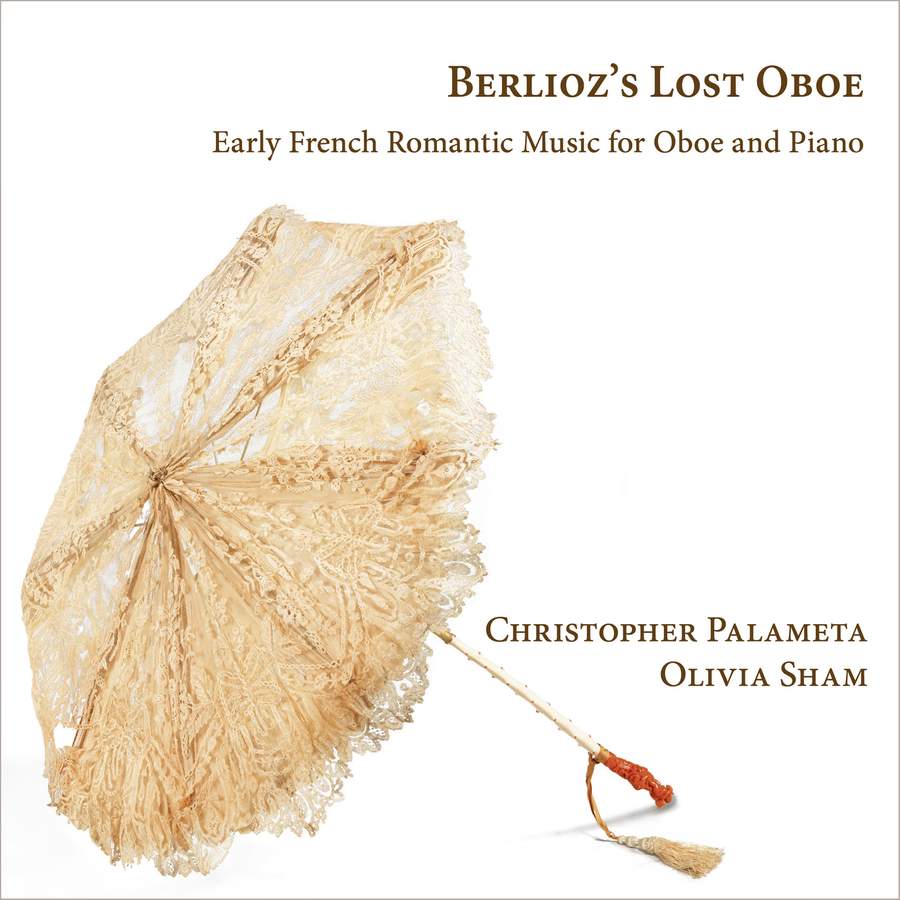Berlioz's Lost Oboe: Early French Romantic Music For Oboe and Piano
View record and artist detailsRecord and Artist Details
Genre:
Chamber
Label: Ramee
Magazine Review Date: 04/2023
Media Format: CD or Download
Media Runtime: 56
Mastering:
DDD
Catalogue Number: RAM2108

Tracks:
| Composition | Artist Credit |
|---|---|
| Nocturne |
(Robert) Nicolas Charles Bochsa, Composer
Christopher Palameta, Oboe Olivia Sham, Piano |
| Vocalises de Crescentini |
Gustav Vogt, Composer
Christopher Palameta, Oboe Olivia Sham, Piano |
| Aranjuez - Fantasie espagnole |
Stanislas Verroust, Composer
Christopher Palameta, Oboe Olivia Sham, Piano |
| Elegie sur la mort d'un objet cheri |
Henri Brod, Composer
Christopher Palameta, Oboe Olivia Sham, Piano |
| Romanze |
Johann Peter Pixis, Composer
Christopher Palameta, Oboe Olivia Sham, Piano |
| Serenade de L'Amant jaloux de Gretry |
Sigismond (Fortuné François) Thalberg, Composer
Christopher Palameta, Oboe Olivia Sham, Piano |
| Nocturnes, Movement: A minor |
Louis Emmanuel Jadin, Composer
Christopher Palameta, Oboe Olivia Sham, Piano |
| Liederkreis, Movement: No. 5, Mondnacht |
Robert Schumann, Composer
Christopher Palameta, Oboe Olivia Sham, Piano |
Author: Guy Rickards
A century before Rodrigo immortalised the palace of Aranjuez in his guitar Concierto (1939), oboist-composer Stanislas Verroust (1814 63) composed a Spanish fantasy for oboe and piano inspired by it. Rodrigo need not fear comparison; Verroust’s charming, intermittently Hispanic-sounding piece is a trifle, part of an intriguing programme of forgotten works by a forgotten generation of French or Paris-resident composers, for an instrument – the oboe – perceived (after the event) as being incompatible with the Romantic aesthetic. As Leon Goossens, of all people, put it: ‘It is a badge of historical injustice that oboists must wear.’ The rather misleading title does not help, and it must be stressed to any prospective purchaser that not a note of Berlioz features.
Christopher Palameta, performing – brilliantly, it must be said – on a Guillaume Adler instrument of the period (c1835), has made matters slightly difficult for his cause in the choice of repertoire. Not in the lack of Berlioz – there are no solo oboe works – but in a group of pretty but largely unremarkable compositions, Henri Brod’s technically demanding Élégie, for example, and the two bland transcriptions by Gustave Vogt of vocal exercises by Girolamo Crescentini. Two of the 10 tracks (Kalkbrenner’s splendid Romance and Thalberg’s operatic serenade), ironically some the strongest music on offer, do not even feature the oboe at all! The anonymous arrangement of Schumann’s ‘Mondnacht’ appears to be included on the tenuous basis that he once met Berlioz after a concert in Leipzig.
The most ambitious work should have been Johann Peter Pixis’s Grande Sonate of 1823, written for piano with flute or oboe, but Palameta and his excellent accompanist Olivia Sham – playing an 1840 Érard – perform only its central Romanze (ironically, later arranged as a separate item for cor anglais by a pupil); why not the whole sonata, rather than a snippet out of context? As a result, it is the Nocturnes by Nicolas-Charles Bochsa and Louis-Emmanuel Jadin that are the most substantial items, both following the same somewhat un-nocturnal course of air varié. Neither is strong enough to lead such a programme, no matter how nicely recorded.
Discover the world's largest classical music catalogue with Presto Music.

Gramophone Digital Club
- Digital Edition
- Digital Archive
- Reviews Database
- Full website access
From £8.75 / month
Subscribe
Gramophone Full Club
- Print Edition
- Digital Edition
- Digital Archive
- Reviews Database
- Full website access
From £11.00 / month
Subscribe
If you are a library, university or other organisation that would be interested in an institutional subscription to Gramophone please click here for further information.




